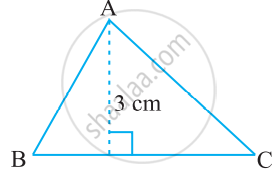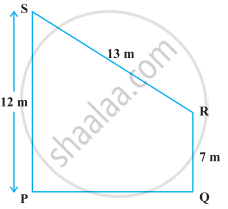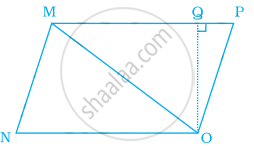Advertisements
Advertisements
Question
A(6,1) , B(8,2) and C(9,4) are the vertices of a parallelogram ABCD. If E is the midpoint of DC, find the area of ΔADE
Solution
Let (x,y) be the coordinates of D and ( x ',y')be thee coordinates of E. since, the diagonals of a parallelogram bisect each other at the same point, therefore
`(x+8)/2=(6+9)/2⇒x =7`
`(y+2)/2 = (1+4)/2 ⇒ y=3`
Thus, the coordinates of D are ( 7,3)
E is the midpoint of DC, therefore
`x' = (7+9)/2 ⇒ x' = 8`
`y' =(3+4)/2 ⇒ y' = 7/2 `
Thus, the coordinates of E are `(8,7/2)`
`"let" A (x_1, y_1) = A(6,1) ,E (x_2,y_2) = E (8,7/2) and D(x_3,y_3) = D(7,3) Now`
`"Area" (Δ ABC) = 1/2 [ x_1(y_2-y_3)+x_2(y_3-y_1) +x_3(y_1-y_2)]`
`=1/2[6(7/2-3)+8(3-1)+7(1-7/2)]`
`=1/2[3/2]`
`=3/4` sq. units
Hence, the area of the triangle ΔADE is `3/ 4`sq. units
APPEARS IN
RELATED QUESTIONS
The class X students of a secondary school in Krishinagar have been allotted a rectangular plot of land for their gardening activity. Saplings of Gulmohar are planted on the boundary at a distance of 1 m from each other. There is a triangular grassy lawn in the plot as shown in the following figure. The students are to sow seeds of flowering plants on the remaining area of the plot.

(i) Taking A as origin, find the coordinates of the vertices of the triangle.
(ii) What will be the coordinates of the vertices of Δ PQR if C is the origin?
Also calculate the areas of the triangles in these cases. What do you observe?
Find the missing value:
| Base | Height | Area of triangle |
| 15 cm | ______ | 87 cm2 |
Find the area of a triangle whose vertices are
(a, c + a), (a, c) and (−a, c − a)
The coordinates of the point P dividing the line segment joining the points A (1, 3) and B (4, 6) in the ratio 2 : 1 are:
Find BC, if the area of the triangle ABC is 36 cm2 and the height AD is 3 cm.

The table given below contains some measures of the right angled triangle. Find the unknown values.
| Base | Height | Area |
| ? | 12 m | 24 sq.m |
If the co-ordinates of the vertices of an equilateral triangle with sides of length ‘a’ are (x1, y1), (x2, y2), (x3, y3), then `|(x_1, y_1, 1),(x_2, y_2, 1),(x_3, y_3, 1)|^2 = (3"a"^4)/4`
Find the area of the trapezium PQRS with height PQ given in the following figure.

Find the missing value:
| Base | Height | Area of parallelogram |
| ______ | 15 cm | 154.5 cm2 |
Area of triangle MNO in the figure is ______.

